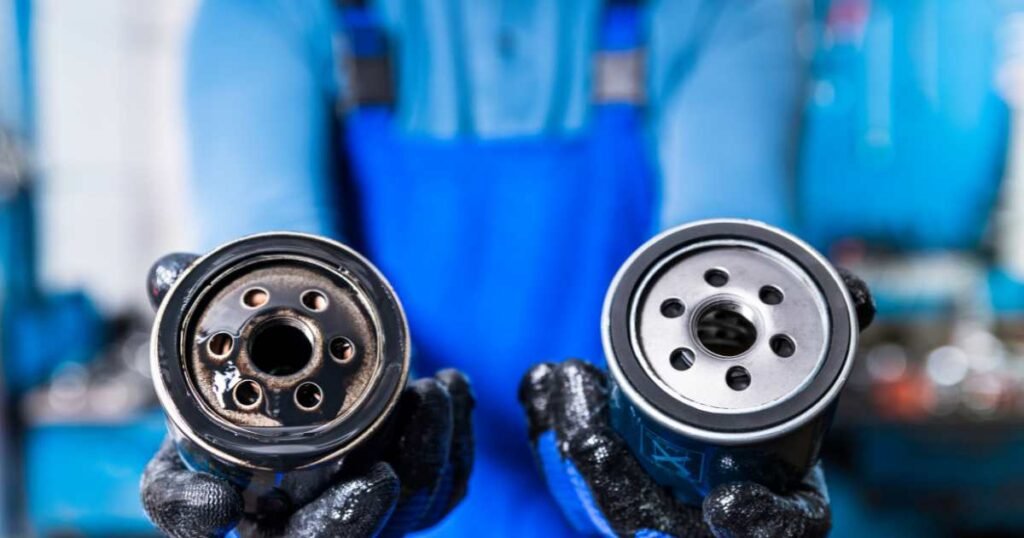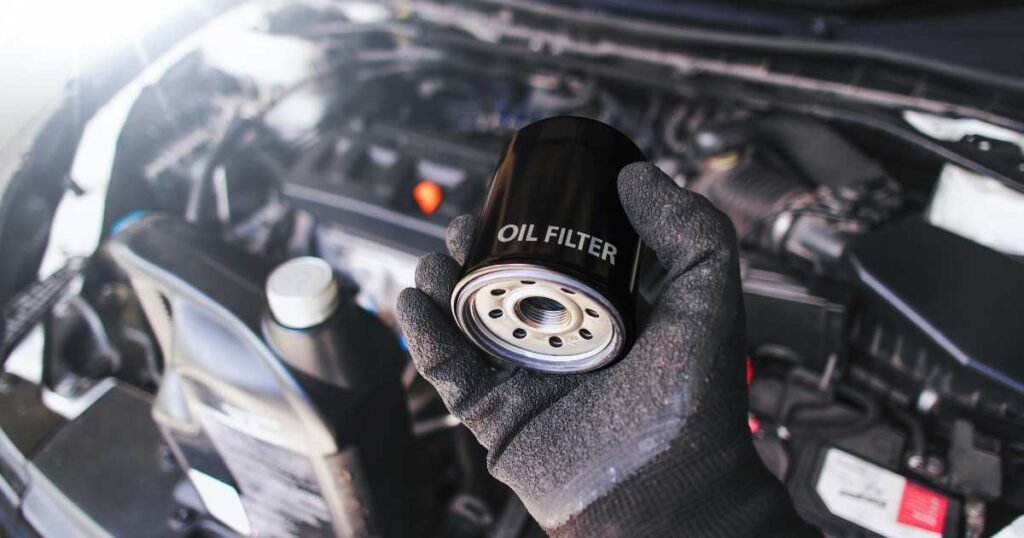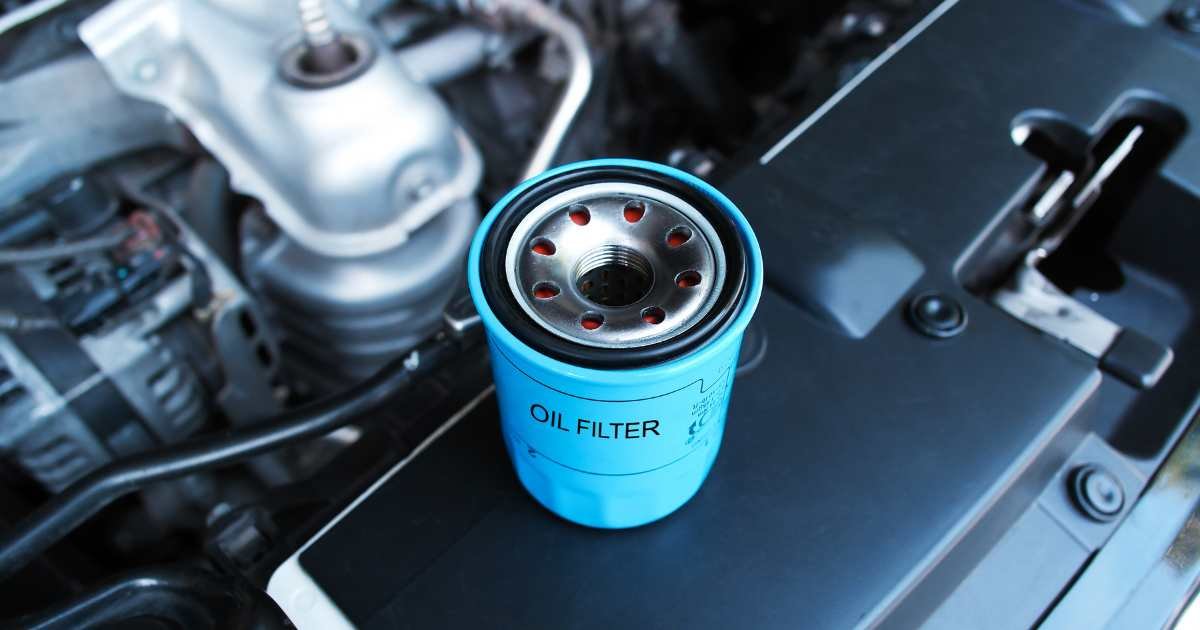For many people who drive, changing the oil is a regular part of caring for their car. Every few thousand miles, they open the hood to check things and change the oil. However, an essential part of this process often doesn’t get much attention: the oil filter. The oil filter might seem simple, but it’s necessary for keeping your car’s engine working well. If you don’t take care of it, it could lead to big problems and cost a lot of money to fix.
Your car’s engine has many moving parts that work together to make the car go. Engine oil is essential because it keeps everything moving smoothly and without trouble. But engine oil doesn’t work alone to do this big job. The oil filter is like a superhero for the engine. It catches any bad stuff in the oil that could hurt the engine.
What happens if you forget to change the oil filter? Well, it’s not good. If the oil filter isn’t changed, it can’t protect the engine as it should, which could damage the engine. That’s why it’s essential to change your oil filter regularly. This way, your car stays happy and runs smoothly.
In this article:
What Happens If You Don’t Change Your Oil Filter?
When the oil in your car gets dirty and the filter doesn’t work right, it can cause many problems for your car. Here are some things that might happen:
- Increased Engine Wear—If the oil has dirt and other nasty stuff, it can make engine parts, like pistons, bearings, and camshafts, wear out faster. This is because dirty oil creates more friction.
- Catastrophic Failure—In the worst situation, if the filter gets totally blocked, it can stop oil from getting to where it needs to go. This means the engine parts don’t get any lubrication. If this happens, the engine can completely break down, and fixing it can cost a lot of money.
- Sludge Buildup—Sometimes, dirty oil can turn into sludge. This sludge can block the paths where oil should flow, preventing oil from reaching the important parts of the engine that need it.
- Reduced Engine Performance—When the engine parts wear out, and the oil can’t flow well, your car might not run as strongly. It could have less power and use more gas.
- Potential Engine Failure—If you don’t change the oil filter when you should, it could cause big problems. The engine might even stop working completely! Fixing this can be expensive, and you might need a new engine.
- Oil Pressure Drop—If the filter gets too clogged, the oil won’t move through the engine properly. This causes the oil pressure to decrease, and the engine won’t get enough lubrication.
- Oil Breakdown—Dirty oil doesn’t work as well as clean oil, especially when it gets hot. This can cause the engine to overheat, and its parts might break.
So, keeping your car’s oil and filter clean and working well is super important. This helps your car stay in good shape and run smoothly.

Why Does Your Oil Filter Matter?
Imagine your car’s engine is like a busy city. Inside, parts move fast, creating a lot of friction and heat. Clean oil is used to keep everything running smoothly and prevent it from getting too hot. It works like a lubricant, ensuring everything moves quickly without too much friction. But, just like a city needs garbage trucks to keep it clean, your engine needs a way to eliminate the bad stuff. This is where the oil filter helps.
The oil filter is essential but often doesn’t get the credit it deserves. It catches things like dirt, tiny bits of metal, and other junk that can come from normal engine use. If these things aren’t taken out, they can be harmful. They work like tiny pieces of sandpaper, slowly wearing down the important parts of your engine.
So, it’s super important to change your oil filter regularly. It’s a small thing that can make a big difference in keeping your car running well.

What Exactly Does an Oil Filter Do?
Motor oil is really important for your car’s engine. It helps by making sure all the moving parts inside the engine can slide past each other easily. This reduces friction when parts rub together, which can cause damage. As the oil moves around the engine, it picks up dirt, tiny bits of metal, and leftovers from fuel burning. These things can make the oil thick and goopy. When the oil gets like this, it can’t move around as well and doesn’t do its job as well.
Now, let’s talk about the oil filter. The oil filter is like a strainer in your kitchen. It catches all the bad stuff in the oil, like dirt and metal pieces. The filter holds onto these things and lets only the clean oil go through. This clean oil then goes on to keep your engine’s important parts running well. By doing this, the oil filter helps protect your engine from getting worn out. This means your car’s engine can last longer and work better.
Why Warning Light On? Don’t Ignore Your Oil Filter!
Many cars today have a special light that tells you when to change the oil. This light usually turns on after you’ve driven a certain number of miles or when it thinks the oil isn’t good. But this light mostly talks about changing the oil, not the filter. Even if you put in new oil, if the filter is dirty, it can cause problems. The dirty filter can stop the oil from flowing well, which might make the warning light come on.
So, when you see that light turn on in your car, remember it’s telling you to do two things. It’s not just time to get new oil; it’s also important to get a new filter. This way, your car stays healthy and runs smoothly. It’s like a helpful reminder to take good care of your car.
How Often Should You Replace Your Oil Filter?
Many people wonder how often they should change their car’s oil filter. In the past, the advice was usually every 3,000 miles. But it’s really important to check your car’s manual, the book that tells you all about your car. This book gives you the most accurate information for your specific car.
Nowadays, the oil and filters we use in cars are made to last longer than before. This means you might have to change the oil filter less often. Depending on your car and how you drive, you might only need to change it every 5,000 or even 10,000 miles. So, always look at your car’s manual for the best time to change the oil filter. This helps your car run well and stay in good shape.
What kind of filter does a vehicle have?
Let’s learn about the different filters in a car, what they do, when they should be replaced, and how much they might cost.
First, there’s the engine air filter. This filter catches dust, dirt, and other small things, so they don’t get into the engine. If this filter gets too dirty, your car won’t run as well and might use more gas. Changing this filter every 12,000 to 15,000 miles or once a year is a good idea. A standard filter is usually between $10 and $25. But if you want a fancy high-performance filter, it could be more than $100.
Next is the cabin air filter. This one cleans the air when you sit in the car. It removes dust, pollen, smoke, and things that can worsen allergies. If this filter gets blocked, it’s harder to keep the inside of your car comfortable. You should change this filter about every 12,000 miles or every year. Depending on the quality, the price for this filter can be from $10 to $50.
Then there’s the oil filter. This filter keeps bad stuff out of the engine oil and helps protect your engine from wearing out too fast. You should change the oil filter every time you change your engine oil, which is usually every 3,000 to 5,000 miles or as your car’s manual says. The cost for an oil filter is about $5 to $15.
Lastly, we have the fuel filter. This one cleans the fuel before it goes into the engine. It keeps dirt and debris from causing trouble in the engine. The best time to replace this filter depends on your car type, but it’s usually between 30,000 and 60,000 miles. A fuel filter can cost between $20 and $75.
Notes: These prices can change based on your car, the filter brand, and where you buy it from. It’s always best to check your car’s manual to know exactly when to change the filters in your vehicle.
What are the Signs You Might Need a New Oil Filter?
It’s always best to follow the schedule your car’s maker suggests for taking care of it. This includes when to change your oil filter. But sometimes, you need a new oil filter sooner than planned. Here are some signs to watch out for:
- Low Oil Pressure—If you see a warning light in your car or the gauge that measures oil pressure, it means the oil pressure is low and the filter isn’t working properly.
- Contaminated Oil—When you check your oil with the dipstick (a special stick in your car that shows how much oil you have), you might see things that shouldn’t be there. If the oil looks dirty, has bits in it, or seems weird (like it looks like a milkshake), it means bad stuff is getting into your oil. This could be a sign that you need to change the filter.
So, keep an eye on these signs. They can help you know when to change your oil filter so your car keeps running smoothly and stays healthy.
Oil Change 101: Don’t Be Fooled by Cheap Shortcuts
Changing your oil filter is easy to do. Some might skip it to save a little money. But saving a few dollars now could cause significant problems later. Here’s why it’s important:
- A False Economy—Sometimes, when you get a cheap oil change, they might not change the filter. This means that even though you have new oil, the old filter won’t work either, and the new oil won’t be as effective, which isn’t good for your car.
- The Hidden Costs of Neglect—Buying a new oil filter doesn’t cost much, especially when compared to fixing a damaged engine. However, if you don’t change your oil filter, your engine can suffer serious damage, which can be really expensive.
Whether you change the oil yourself or take your car to a professional, make sure they put in a new filter. This small step is a big help in keeping your engine healthy. It’s a wise choice that will save you money in the long run and keep your car running well.
Final Thought
Cars are a bit like people – they don’t like being dirty and uncared for. If you don’t change the oil filter when you should, your car might start having problems. It could run poorly and make weird noises. This is like your car being grumpy because it’s not being looked after properly. Think of changing the oil filter to keep your car happy and quiet!
When you understand how important the oil filter is and remember to change it regularly, you help your car run smoothly. This means it will work well for a long time. Just a little bit of care can make a big difference. It keeps your car happy and ready to go on many more adventures with you!
Relevant:
What Maintenance Does a Car Need?
What happens if you don’t change your oil?
What Does A Full-Service Oil Change Consists Of?
How Much is an Oil Change at NTB?
FAQs
Can I change my oil without changing the filter?
No, you should always replace the oil filter when you change your engine oil. A new filter helps keep the oil clean and protects your engine from harmful substances.
What type of oil filter should I use?
There are different types of oil filters, such as standard and high-performance ones. To find out which is best for your car, look in the car’s manual or ask a mechanic.
How long can you go without changing your oil filter?
It depends on your car and how you drive. You should usually change the oil filter when you change the oil. This is typically every 3,000 to 5,000 miles for regular oil and 7,500 to 10,000 miles for synthetic oil. Some newer cars might say you can wait longer.
Can you reuse the same oil filter twice?
No, you shouldn’t do that. The filter gets full of bad stuff and won’t work well the second time. Filters don’t cost much, so getting a new one each time you change the oil is a smart choice.
Can I change my oil filter myself?
Yes, many car owners can change their oil filters by themselves. But if you need help or feel uncomfortable, it’s best to ask a mechanic for help.
Is it OK to change the oil without changing the filter?
No, it’s not a good idea. The oil filter catches the bad stuff from the oil when your car is running. If you use an old filter with new oil, the dirty stuff gets back into the latest oil and makes it not work as well.
Here’s why changing both is essential:
- It’s better for your engine—A new filter means the new oil stays clean, which is good for your engine.
- It saves money in the long run—Changing the filter when you change the oil costs a little, but it can save you from big engine problems later.
Can you drive with an old oil filter?
You can drive a little, but it’s not a good idea. An old filter that’s clogged or dirty can cause problems like:
- More wear on the engine—Dirty oil can damage engine parts.
- Your car might not run as well: If the oil can’t flow right, it can make it lose power and use more gas.
- The engine could get too hot—Not enough lubrication can make the engine overheat, which can be harmful.
